Exploring 15 Iconic INTP Characters
Curious, analytical, and independent – INTPs are often pegged as the “mad scientists” in the world of fiction. However, there’s so much more to these ingenious introverts than the stereotypes you might see on the big screen! That said, here are fifteen fictional characters who exemplify some of the greatest strengths and potential weaknesses of the INTP personality type!
Not sure what your personality type is? Take our new personality questionnaire here. Or you can take the official MBTI® here.
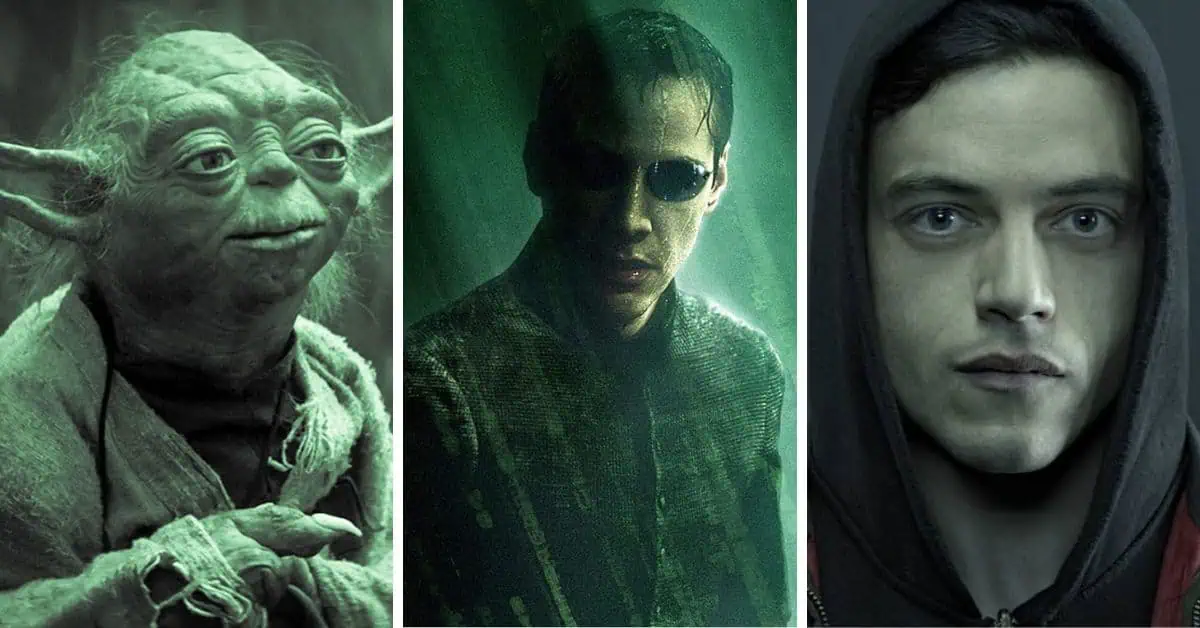
This article contains affiliate links to books on Amazon. If you purchase one of these books, I get a small kickback that I can use to pay for hosting and other demands of this site. I only recommend books I love.
Table of contents
- 15 Fictional Characters You’ll Relate to if You’re an INTP
- #1 – Margaret “Meg” Murry from “A Wrinkle in Time”
- #2 – Neo from “The Matrix”
- #3 – Winston Smith from “1984”
- #4 – Ranpo Edogawa from “Bungou Stray Dogs”
- #5 – Betee Latier from “The Hunger Games”
- #6 – Violet Baudelaire from “A Series of Unfortunate Events”
- #7 – Alice Kingsleigh from “Alice’s Adventures in Wonderland”
- #8 – Elliot Alderson from “Mr. Robot”
- #9 – Bruce Banner “The Hulk”
- #10 – Abed Nadir from “Community”
- #11 – L Lawliet from “Death Note”
- #12 – Arthur Weasley from “Harry Potter”
- #13 – Hiccup Horrendous Haddock III
- #14 – Yoda
- #15 – Ben Hargreeves (The Umbrella Academy)
- What Are Your Thoughts?
Estimated reading time: 13 minutes
15 Fictional Characters You’ll Relate to if You’re an INTP
#1 – Margaret “Meg” Murry from “A Wrinkle in Time”
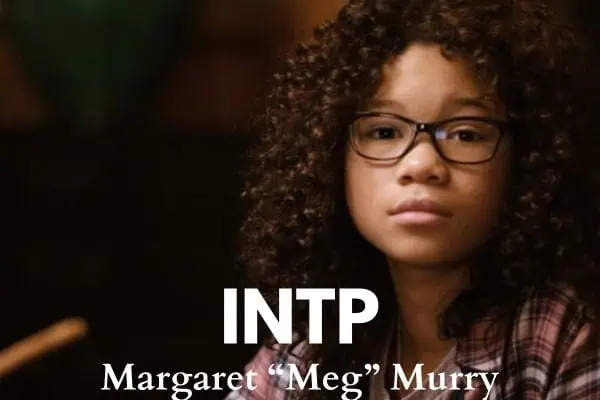
Rebellious yet surprisingly intelligent, Meg Murry has a habit that many INTPs struggle with: Her intelligence isn’t as obvious on the outside as it is evident on the inside. While she underperforms in school and clashes with authority figures, she has an intellect and wisdom that shows up when the welfare of her entire family depends on it. INTPs often struggle to take authorities seriously, and because they hold themselves to an internal standard rather than an external one, they are often underestimated by others (even themselves). Many INTPs, especially INTPs who have struggled with loss, will relate to the life struggles that Meg faces in her story.
#2 – Neo from “The Matrix”
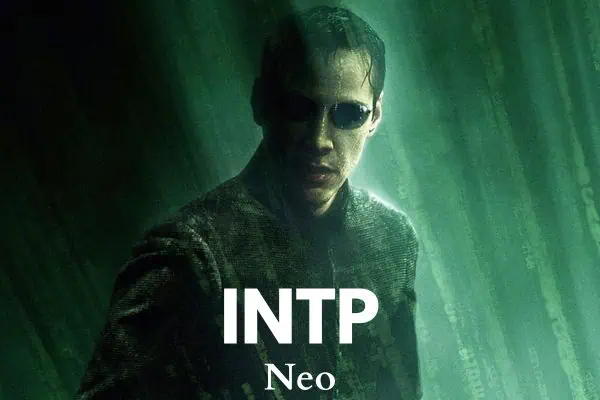
Thomas A. Anderson, or “Neo” as he is later called, is a software programmer who wants to know everything he can about the background processes at work in the world. He senses that there’s more to life than can be experienced tangibly – a secret that could dismantle everything he trusts as “real.” In typical INTP fashion, Neo chooses to take the red pill – a choice that is dangerous but enlightening, rather than the blue pill of comfort and security. Neo’s ingenious mind, curiosity, and hunger for truth and understanding will be relatable to any INTP.
#3 – Winston Smith from “1984”
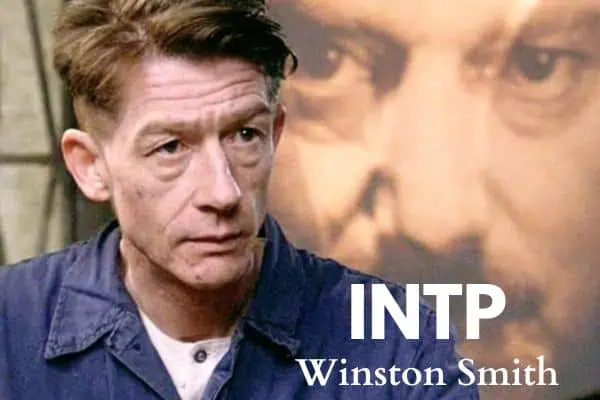
Rebellious and curious, Winston Smith will fight against innumerable risks to unveil the truth behind “Big Brother.” He is constantly challenging the authority of the Party, even if it means he could lose his life in the process. His rebellious nature, analytical mind, and quest for the unadulterated truth is something that any INTP will relate to. His yearning for freedom and independence is something that INTPs prioritize to the highest degree.
#4 – Ranpo Edogawa from “Bungou Stray Dogs”
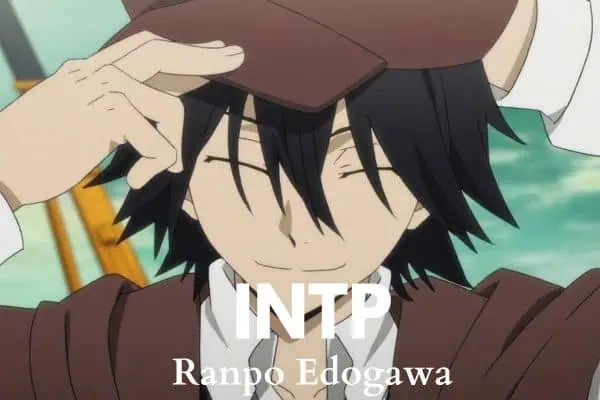
Extraordinarily intelligent, Ranpo Edogawa is able to solve crimes almost instantaneously because of his keen powers of deduction. Edogawa can quickly formulate theories and then find the necessary facts to support his theories. Jung himself said, “Ti formulates questions and creates theories, it opens up new prospects and insights…facts are collected as evidence for a theory, never for their own sake.” This likely explains why Edogawa is an unmatched genius in deductive reasoning but still struggles to figure out which train to take to get around town. His curiosity, wit, and ability to see truth in a complicated world makes him a strong choice for an INTP anime character.
#5 – Betee Latier from “The Hunger Games”
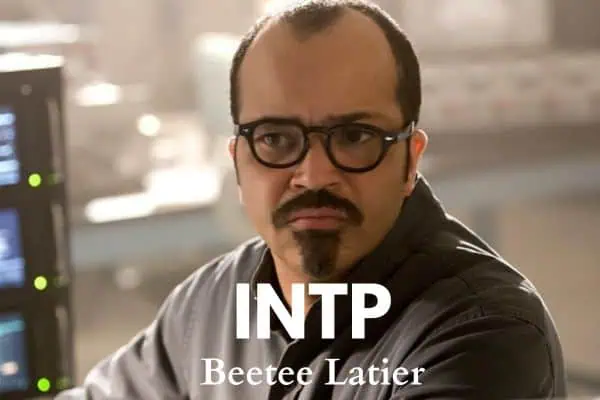
Quiet and calm but devastatingly intelligent, Betee Latier was underestimated from the beginning. No one thought that someone from District 3 could make it in the arena, but Latier showed just how powerful the INTP mind can be in a crisis. His knowledge of electricity and his unique ability to craft innovative strategies and plans made him the competitor you never saw coming. Even in the most bewildering scenarios, his intellect and vision never failed him.
#6 – Violet Baudelaire from “A Series of Unfortunate Events”
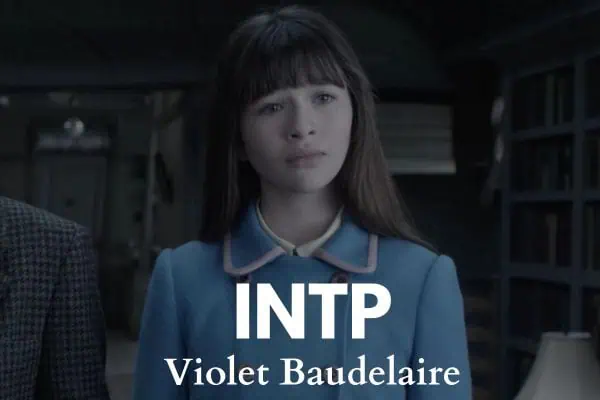
There’s a lot of disagreement about Baudelaire’s type. Many people think INTP, while many others insist on ISTP. Whatever the case, INTPs will strongly relate to Violet’s character. Violet excels at thinking creatively and solving complex problems. She’s able to rig up incredible inventions out of practically anything, and her powers of imagination are able to keep her and her siblings safe against their despicable uncle, Count Olaf.
#7 – Alice Kingsleigh from “Alice’s Adventures in Wonderland”
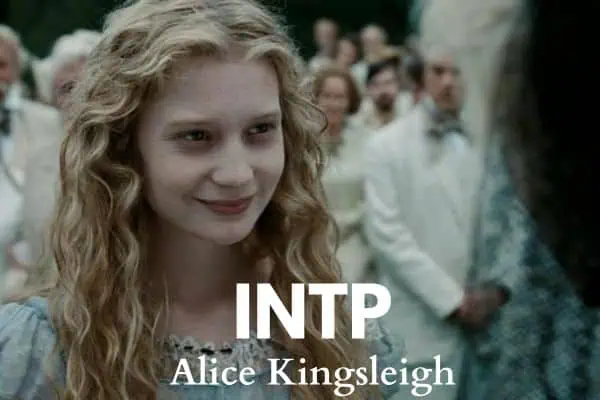
Rebellious and curious, Alice questions the conventions and traditions of her time. She famously asks the question, “Who’s to say what’s proper? What if we agreed that ‘proper’ meant wearing codfish on your head? Would you wear it?” INTPs will relate to how Alice questions the rules and expectations of her time. They will also relate to her need for independence, her curiosity, and her desire to understand the truths of the universe.
#8 – Elliot Alderson from “Mr. Robot”
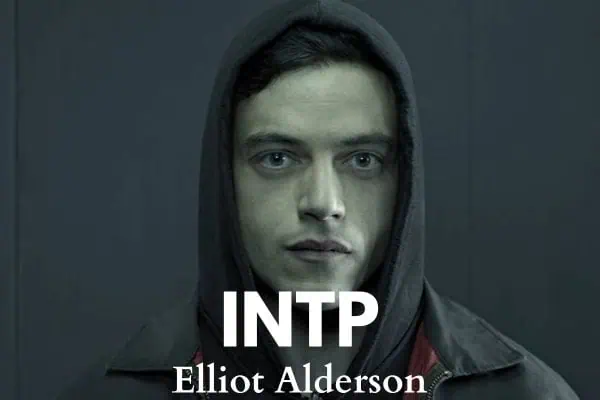
Intelligent and insightful, Elliot Alderson captures the driving curiosity of the INTP personality type. In typical Introverted Thinking fashion, Alderson has to absorb information about every system he encounters. He’s a talented hacker and works well with impersonal systems – quickly guessing people’s passwords and unveiling the underlying frameworks of computer programs and security systems. He can also quickly make external connections thanks to his Intuitive side – quickly finding relationships between current information and data he’s stored in his mind.
#9 – Bruce Banner “The Hulk”
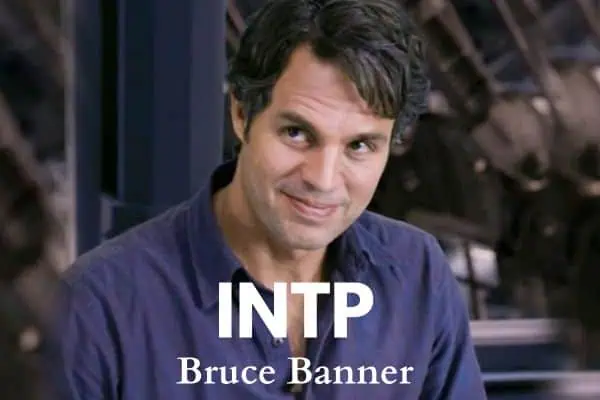
Introspective and questioning, Bruce Banner captures the quiet analytical side of the INTP personality type. He builds up complex internal theories in his mind and tries to perfect his ideas and plans before presenting them to the world. Sometimes this frustrates his ENTP counterpart (Tony Stark) who wants to make things happen as quickly as possible and experiment and press buttons as his curiosity strikes him. However, the two often share an understanding of each other because they are working with the same mental components (Introverted Thinking and Extraverted Intuition). Banner’s wit, curiosity, and hunger for knowledge are all things that INTPs will relate to.
#10 – Abed Nadir from “Community”
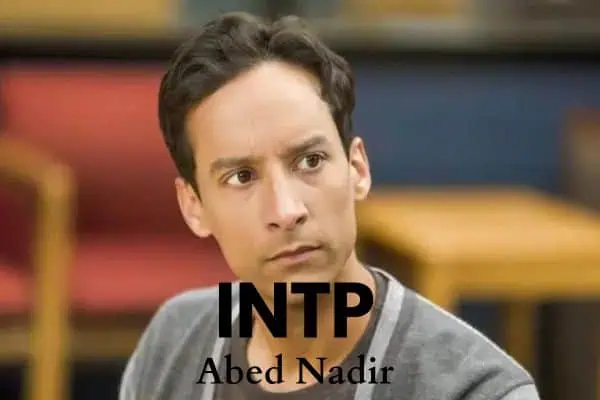
Creative, intelligent, and quirky, Abed Nadir captures the imagination and quick-thinking powers of the INTP. He can rapidly draw connections to real-life situations through pop culture and meta-references gained from years of watching TV and movies (an exceptional example of Extraverted Intuition and Introverted Sensation working together). He also can often predict other people’s behaviors and reactions, thanks to his Thinking and Intuition combined. Yet, because Adir is a perceiver, he values an independent, adaptable lifestyle rather than one that is thoroughly ironed out and structured. He gets quickly bored with routine and tends to “blitz” through projects at the last minute rather than working in a methodical way.
#11 – L Lawliet from “Death Note”
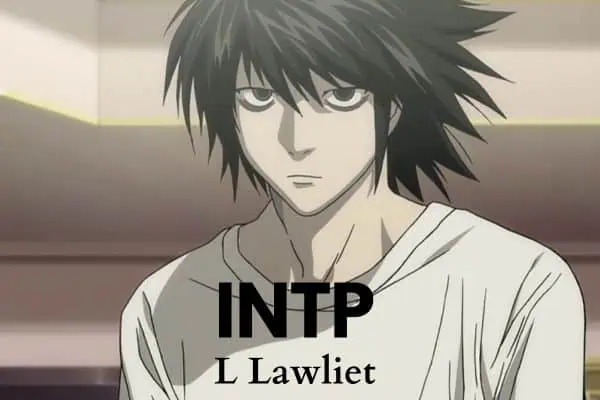
Intensely intelligent yet often underestimated, L captures the ingenious but often haphazard nature of the INTP personality type. People tend to misjudge him due to his disheveled appearance and lack of tact, but his analytical abilities and strong powers of deduction are next to none. In typical INTP fashion, L has a creative, clever sense of humor and an ability to connect the dots in complex situations. He’s driven by a desire to understand and solve mysteries, and many INTPs will relate to this hunger for discovery and truth.
#12 – Arthur Weasley from “Harry Potter”
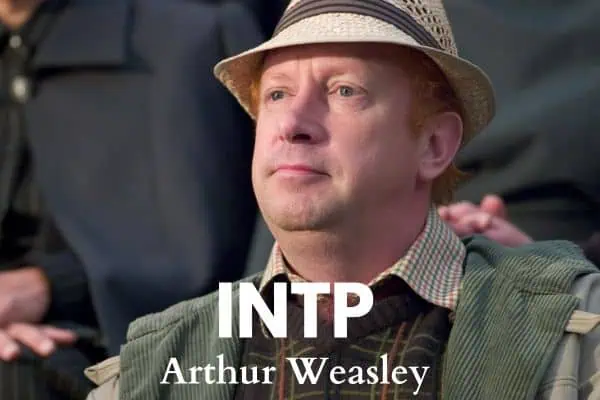
I love Arthur Weasley for many reasons, but one of them being that he shows a warm, protective version of the INTP type. While many fictional INTPs are detached and somewhat cold, it is dangerous to think that all INTPs are like this. Many INTPs are very protective of their loved ones and care deeply for their friends. Arthur Weasley has the curiosity and laid-back nature of the INTP, as well as the inventiveness that the type is famous for. Arthur also embodies the warmth that many INTPs develop as they mature and progress in life. While in their early years many INTPs struggle to understand emotional complexities, as they get older they become more in tune with the feelings of the people around them.
#13 – Hiccup Horrendous Haddock III
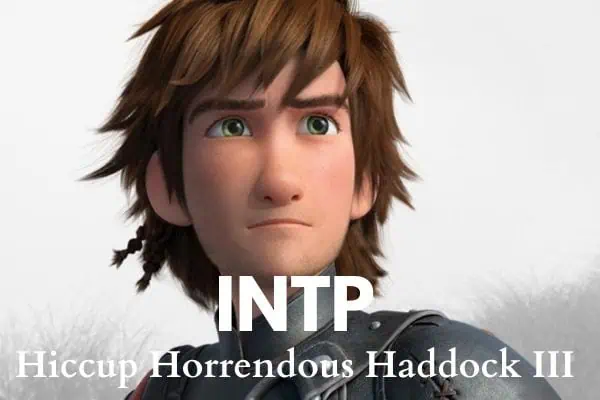
Hiccup Horrendous Haddock III, the unlikely hero from “How to Train Your Dragon,” embodies the essence of an INTP personality type. Known for his inventive and curious nature, Hiccup constantly challenges the traditional norms of his Viking society. While the other Vikings are entirely focused on dragon slaying, Hiccup uses his logical mind to find inventive solutions, ultimately discovering ways to coexist with dragons. This curiosity and non-traditional approach set him apart, but also make him a pariah at first.
Despite his reclusive tendencies, Hiccup’s desire to be liked and accepted by his peers is evident. INTPs will relate to this! Yes, they like their alone time and they tend to feel confused by the emotional whims of other people, but they still have a desire to be accepted and part of a community. Hiccup might often withdraw into his own world of mechanical inventions and deep thoughts, but his actions show a longing for social connection and approval.
#14 – Yoda
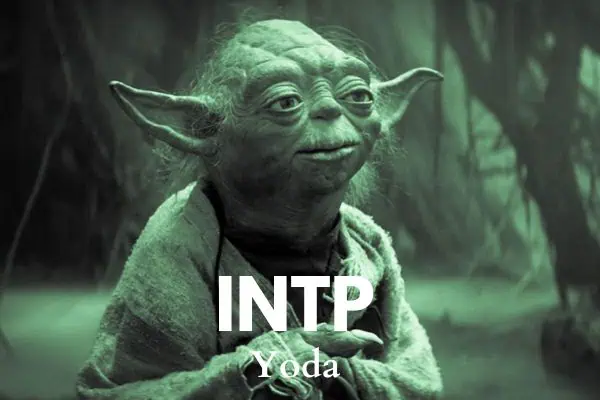
Yoda, the sage Jedi Master from “Star Wars,” is one of my favorite INTP characters. Renowned for his wisdom and understanding of the Force, Yoda habitually questions and contemplates the deeper meanings of existence. In quiet and seclusion he analyzes, meditates, and forms insights. Like most INTPs, he’d rather consider insights, possibilities, and options before acting. “Patience you must have, my young Padawan. Have patience and all will be revealed,” is, after all, one of his most famous quotes.
Despite his reclusive disposition, Yoda demonstrates a profound concern for the well-being of others, particularly his fellow Jedi and the balance of the Force. He may often retreat into solitude to engage in profound reflection and seek enlightenment, but his teachings and guidance reveal a commitment to mentorship and the greater good. This quiet deliberation and profound insight equip Yoda to see beyond the immediate, identifying solutions that others might overlook. His blend of introspection, immense knowledge, and a subtle rapport with those around him firmly establishes Yoda as a quintessential INTP.
#15 – Ben Hargreeves (The Umbrella Academy)
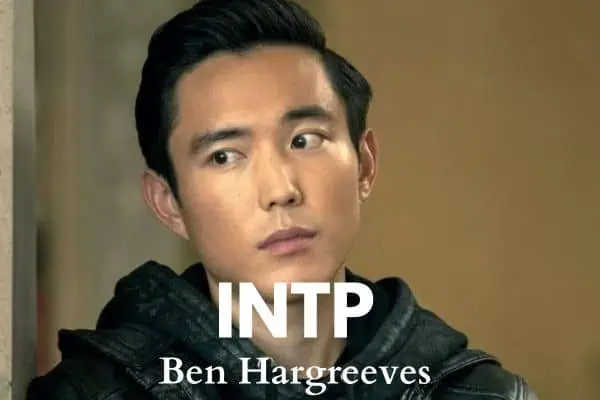
Ben Hargreeves finds himself in the worst-case scenario for a Perceiving personality type. He’s dead, and his only means of communicating with the living is through his drug-addicted brother, Klaus. As an INTP, Ben is logical, analytical, and often lost in thought. He’s not driven by emotions, but he cares deeply for his family. Despite his unfortunate ghostly state, he strives to protect his siblings from impending danger. In the first two seasons of the Netflix series, Ben is portrayed as soft and empathetic, whereas in the comic book series, he has a more biting, analytical demeanor. He can be sarcastic and insulting at times, but he’s deeply sensitive and frustrated by his inability to do more for his family. Thinking types can be as caring and compassionate as feeling types, but they express it differently. For Ben, protecting his family is his priority, even if it means making harsh comments to them.
What Are Your Thoughts?
Did you enjoy this article? Do you have any insights or suggestions to share? Let us know in the comments! You can also discover more about your personality type in the INTX Unleashed eCourse!
Find out more about your personality type in our eBooks, Discovering You: Unlocking the Power of Personality Type, The INFJ – Understanding the Mystic, The INFP – Understanding the Dreamer, and The INTJ – Understanding the Strategist. You can also connect with me via Facebook, Instagram, or Twitter!
Other Articles You Might Enjoy:
24 Signs that You’re an INTP, the “Prodigy” Personality Type

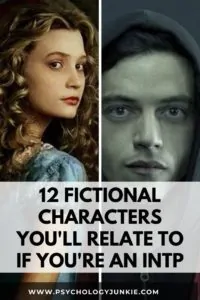














I am an INTP by every test although I keep testing (I’m an INTP after all.) This site is great. I am an admirer of AJ Drenth, but am becoming more entranced with your input as I have recently taken a more careful look at your approach. You are uniquely personal, yet accurate. I am sorry I didn’t appreciate your approach earlier in my explorations. Keep going…
Wow! This means a lot to me, thank you so much!!
No wonder why I fell in love with L Lawliet from Death Note the first time I watched the anime because I could relate to him in high school. I didn’t know I was an INTP back then. I took the personality test in college as a requirement for us before we graduate and found out that I’m an INTP. So imagine my surprise when I found out that my high school anime crush is an INTP, too.
EXACTLY THE SAME!
So, basically, you just took characters that are typed INTP and list them.
Amongst these, I relate to Alice Kingsleigh during my teenage years, Bruce Banner during uni, and currently Arthur Weasley after I started adulting in the earnest.
My INTP personality type is somehow almost exactly the same as my ADHD-Inattentive presentation.
The book list is not the type of books that I would read.
As a African American my interests, experiences are vastly different from some of the Eurocentric culture and values.
Also I think that the Personality tests theories, are based on the larger Eurocentric population.
I can agree on some of the basic theories.But some of these do not fit those who are not of a Eurocentric background.